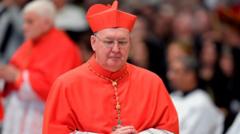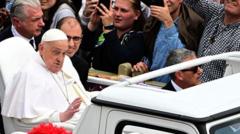Pope Francis, known for his commitment to marginalized communities and progressive views, passed away at 88, leaving a vacuum in leadership. His death prompted global mourning as citizens and leaders praised his efforts in promoting compassion, inclusivity, and interfaith dialogue, highlighting the significant impact he made during his twelve years as pope.
Mourning the Passing of Pope Francis: A Legacy of Compassion and Inclusion

Mourning the Passing of Pope Francis: A Legacy of Compassion and Inclusion
Citizens around the world honor the life and impact of Pope Francis, as tributes flow in from leaders, mourners, and faithful followers following his recent death at age 88.
April 21, 2025, 7:00 p.m.
Vatican City mourns the passing of Pope Francis, who died unexpectedly at age 88 on April 21. His death, announced by the Vatican early in the morning, surprised many, particularly those who had seen him bless the faithful just a day earlier for Easter Sunday. World leaders and citizens have come forward to honor Francis’s legacy, reflecting on his remarkable dedication to the poor and marginalized.
Pope Francis's papacy spanned a transformative twelve years, marked by a focus on inclusivity and confronting social issues. Many gathered in St. Peter's Square to pay respects amidst an outpouring of grief from global communities. Cardinal Kevin Farrell, who will preside over the Vatican’s affairs during the transition period, acknowledged Francis's return to the Father, reverberating through centuries of Church tradition.
In Rome, grief-stricken mourners gathered at St. John Lateran, the place where many felt connected to their bishop. “It’s a deep sense of loss,” said one Roman, echoing sentiments felt worldwide. While friends and family had anticipated that his health might be deteriorating, the shock of loss remained. “He represents a figure of peace and hope,” shared another devotee.
Leaders from different nations, including former U.S. President Barack Obama, expressed admiration, recounting how Francis inspired many to strive for better human values and moral obligations. “He made us want to be better people,” Obama remarked, underscoring Francis's universal legacy beyond the Catholic sphere.
As the Church prepares for the transition, speculation is rife about who will fill the void. Francis’s approach of promoting dialogue, tolerance, and advocacy for the marginalized suggests his successor must navigate a complex reflection of his values, with calls for a continuation of his inclusive work on social injustices, climate change, and migrant rights.
Pope Francis’s commitment to engage with the marginalized and his push for compassion set a poignant example for leaders worldwide. His final public address, addressing the vulnerable and marginalized, was a fitting capstone to a papacy defined by a relentless quest for inclusivity and understanding. The emotion surrounding his death reflects a broader desire for leaders who share these essential values in an increasingly polarized world.
The subsequent days will reveal the significant shifts this monumental change in leadership will bring, not only to the Catholic Church but to the global community that has found strength in the messages and actions of Pope Francis. His legacy, a clarion call for kindness and responsibility, now rests in the hands of those who continue his mission.
Vatican City mourns the passing of Pope Francis, who died unexpectedly at age 88 on April 21. His death, announced by the Vatican early in the morning, surprised many, particularly those who had seen him bless the faithful just a day earlier for Easter Sunday. World leaders and citizens have come forward to honor Francis’s legacy, reflecting on his remarkable dedication to the poor and marginalized.
Pope Francis's papacy spanned a transformative twelve years, marked by a focus on inclusivity and confronting social issues. Many gathered in St. Peter's Square to pay respects amidst an outpouring of grief from global communities. Cardinal Kevin Farrell, who will preside over the Vatican’s affairs during the transition period, acknowledged Francis's return to the Father, reverberating through centuries of Church tradition.
In Rome, grief-stricken mourners gathered at St. John Lateran, the place where many felt connected to their bishop. “It’s a deep sense of loss,” said one Roman, echoing sentiments felt worldwide. While friends and family had anticipated that his health might be deteriorating, the shock of loss remained. “He represents a figure of peace and hope,” shared another devotee.
Leaders from different nations, including former U.S. President Barack Obama, expressed admiration, recounting how Francis inspired many to strive for better human values and moral obligations. “He made us want to be better people,” Obama remarked, underscoring Francis's universal legacy beyond the Catholic sphere.
As the Church prepares for the transition, speculation is rife about who will fill the void. Francis’s approach of promoting dialogue, tolerance, and advocacy for the marginalized suggests his successor must navigate a complex reflection of his values, with calls for a continuation of his inclusive work on social injustices, climate change, and migrant rights.
Pope Francis’s commitment to engage with the marginalized and his push for compassion set a poignant example for leaders worldwide. His final public address, addressing the vulnerable and marginalized, was a fitting capstone to a papacy defined by a relentless quest for inclusivity and understanding. The emotion surrounding his death reflects a broader desire for leaders who share these essential values in an increasingly polarized world.
The subsequent days will reveal the significant shifts this monumental change in leadership will bring, not only to the Catholic Church but to the global community that has found strength in the messages and actions of Pope Francis. His legacy, a clarion call for kindness and responsibility, now rests in the hands of those who continue his mission.






















